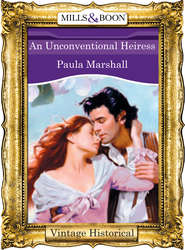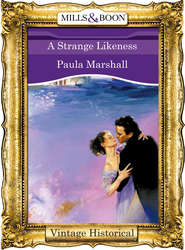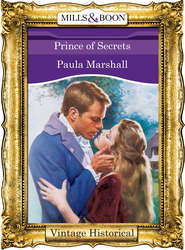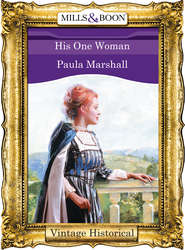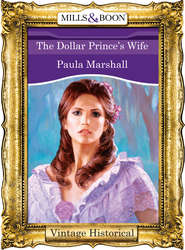По всем вопросам обращайтесь на: info@litportal.ru
(©) 2003-2024.
✖
Jack Compton's Luck
Настройки чтения
Размер шрифта
Высота строк
Поля
Besides that, the attraction of a London season had begun to pall. At first everything being so different from home had interested and intrigued her, but the novelty of it all had soon worn off. She had become used to a busy intellectual life back in the States and found the conversation of most of those whom she met—particularly the young men—increasingly empty. One of the reasons why Jack had attracted her was his lively mind and his open interest in everything.
Everyone seemed to have such perfect manners, which somehow made it worse. Aunt Sue was plainly disappointed by what she called Lacey’s lacklustreness. She had been annoyed when Lacey had asked her politely if there was such a word, and had snapped back, brusquely for her, ‘If there isn’t, then there should be.’
Lacey was mooning after Jack Compton, Aunt Sue supposed, which, when every young man of wealth and title in society was interested in her, seemed an awful waste.
Richard said to Lacey one evening when they were waiting to go into dinner at yet another great London house, ‘This bores you, doesn’t it?’
‘If I’m honest, yes.’
‘Hankering after him?’
Lacey knew who him was. She tried to deflect her half-brother’s shrewdness by saying, apparently idly, ‘A little, I suppose.’
‘More than a little, I think. I’ve a suggestion for you. Why don’t you go down to Sussex and begin the task at Ashdown that we discussed when you first came over? You might enjoy that more than you seem to be enjoying the season. If you don’t, you can always come back again and have another go here.’
‘Aunt Sue would throw a conniption fit if I proposed any such thing!’
‘It’s your life, not Aunt Sue’s. I’ll try to soap her down for you. I’ll write letters of introduction for you to some of the families there who are my good friends. Come on, lass, I don’t intend my London home to become your prison. Give me a few days to write to Mason, my agent at Ashdown, asking him to make the place ready for you, and then you can be off. How about it?’
Why not? She would almost certainly meet Jack again and discover whether he had simply been trifling with her. She would be able to enjoy herself, not only in examining and cataloguing the house’s contents, but also in arranging the furniture, pictures and other treasures there to their best advantage.
So she simply said, ‘Yes, I’ll do what you propose—and soon, please.’
‘Good girl. Now, leave Aunt Sue to me.’
Consequently here she was in seely Sussex—whatever that meant—sitting in the drawing room of one of Richard’s friends, waiting for dinner at the home of Sir Burton and Lady Barrington. Aunt Sue, not completely mollified, was sitting opposite to her, neither of them sure whether Lacey had done the right thing by adopting Richard’s suggestion.
Interestingly enough, the idle conversation around her was about the Comptons and their dire situation. No financial details were given—it would not have been proper—simply that the brothers and their nephew were living a Spartan life in the house with very few servants to look after them or it.
‘Apparently,’ said one middle-aged man, ‘Jack has decided that so far as staff is concerned, the needs of the farm comes first.’
‘A bit hard on Will,’ said another.
The first man shrugged. ‘Oh, he’s well cared for, I believe, and the boy. The hard part is Jack’s.’
After that the next topic of conversation was about a financier called Bernard Montague, one of the hard-faced men who had done well out of the war, as the yellow press had it.
‘He’s on the look-out for a country house,’ said speaker number one who obviously knew all the County’s gossip. ‘Wouldn’t be surprised if he made a bid for Compton Place.’
Their hostess put in a word. ‘Oh, I’m sure that neither Will nor Jack would ever sell it. The Comptons have been there almost since the Conquest.’
‘Wouldn’t be the first,’ said one old fellow gravely, and all the wiser heads nodded agreement.
What to Lacey was surprising was that, a few minutes after the Comptons had disappeared from the conversation, the door opened, the butler entered, and announced, ‘Mr Jack Compton, m’lady.’
At first Jack had wished to refuse the invitation from the Barringtons, which had arrived one morning when he had been busy birthing a calf without the help of a vet.
Will, however, would not allow any such thing.
‘Good God, Jack, you live the life of a monk. Go and enjoy yourself for a change.’
Jack didn’t wish to say that he was so busy that all he wanted to do at the day’s end was to retire to bed and go to sleep. It sounded such odd behaviour for a healthy man in his early thirties to indulge in. It was true, though.
‘My dinner jacket is barely fit to stand another outing.’
‘Oh, damn that for a tale. Judson!’ he bellowed. Judson, who was engaged in the entrance hall in mending a doorknob which had gone wrong—his description—put his head round the drawing-room door.
‘You rang, sir?’ he asked in an exquisite parody of a butler.
‘I called for you, yes. Tell Jack that he must accept this invitation to the Barringtons’ dinner.’
‘Only too happy. Accept the invitation to the Barringtons, Jack, and on the double. Will that do?’ Judson bawled, now imitating a Regimental Sergeant-Major.
‘It had better,’ snarled Will. ‘You heard that, Jack?’
‘I should think that half the county heard it,’ retorted Jack, ‘but since you have both asked me so nicely, I’ll go.’
So go he did, and the first person he saw when he walked into the Barringtons’ drawing room was Lacey Chancellor, staring at him and his antique dinner jacket as though she had never seen it, or him, before.
Thank God for bullying brothers and batmen, was his first instinctive reaction, without them I shouldn’t have met her quite so soon. Even so, he thought it his salvation that he immediately had to do his duty to his host and hostess before he was able to speak to her.
They, and he, said all the proper things. They asked after Will and Robbie, and assured him how pleased they were that he had accepted their invitation to dinner. He congratulated them on Sir Burton having been appointed one of the Deputy Lord Lieutenants of the county. All the time he was keenly aware of Lacey’s presence even though he now had his back to her.
Lady Barrington took him over to her, saying on the way, ‘Did you meet Miss Chancellor while you were in London, Jack? If not, I will introduce you to her.’
‘Fortunately, yes,’ he replied, hoping that he did not sound as stiff as he felt, ‘I had that honour.’
‘Excellent,’ said his hostess. ‘You will be taking her into dinner. The bell will ring as soon as the Wickhams arrive. They are famous for being late.’
Lacey and Aunt Sue rose, to be effusively greeted by Lady Barrington.
‘I understand that you and Jack have already met, which, since I had decided that he would make you an excellent dinner partner, was very providential. Miss Hoyt, I have arranged for you to be taken in by Charles Jackman—he’s recently been travelling in the States.’
Both Lacey and Jack had been stricken dumb by their unexpected meeting. Jack was the worst afflicted since he had had no notion that Lacey was other than miles away in London, enjoying the season to the full, whereas Lacey did at least know that Jack lived somewhere nearby.
What Lacey wanted to say, but could not in this company was, ‘Why did you not answer any of my letters?’ What she did say was, ‘I had no idea that Sussex was such a lovely county,’ and all that Jack could find to answer her with was,
‘Yes, it is, isn’t it.’
The good thing was that after this exchange of banalities, so different from their previous lively conversations, they both began to laugh at themselves at the same time. Surprised heads turned a little at their amusement. They were saved from further embarrassment by the ringing of the dinner bell.
‘You know,’ Lacey whispered to him, after they had sat down, ‘if all our meetings had been productive of such horrendous social clichés I don’t think that I would have been so cross with you for not answering my letters. Rather, I should have been relieved!’
‘There was a reason for my not replying,’ Jack whispered back to her.
‘It had better be a good one. The only happy thing about it was that Aunt Sue was very pleased that you didn’t write because she hoped that it would mean the end of the affair.’
‘Hardly an affair,’ was Jack’s murmuring answer.






